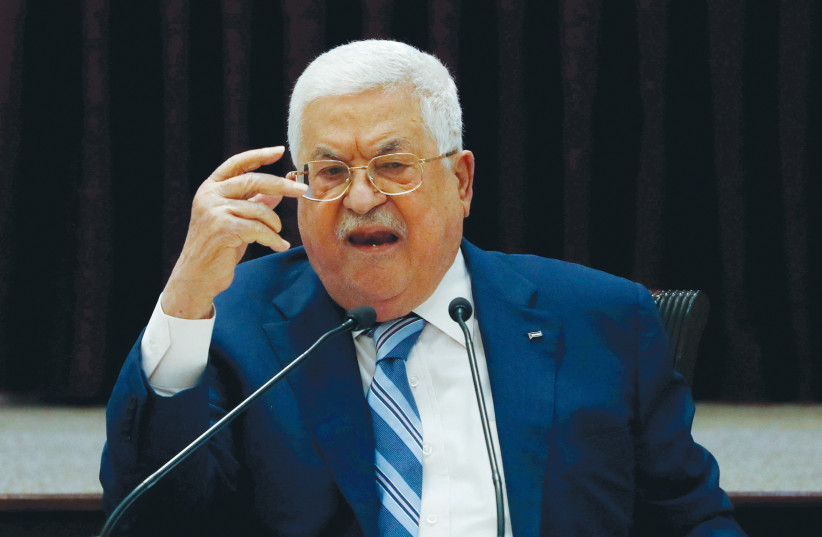Palestinian Authority Prime Minister Mohammad Shtayyeh on Tuesday told US Deputy Assistant Secretary of State for Israeli and Palestinian Affairs Hady Amr that the launch of a peace process with Israel should be preceded by confidence-building measures.
Shtayyeh, who met with the US envoy in Ramallah, said that the Palestinians want Israel to abide by signed agreements between the two sides.
“The launch of a serious political process must be preceded by confidence-building measures, and we want the new Israeli government to abide by the signed agreements, including holding elections in Jerusalem,” Shtayyeh said.
He was referring to the controversy surrounding the participation of Arab residents of Jerusalem in the Palestinian parliamentary and presidential elections that were supposed to have taken place on May 22 and July 31 respectively.
PA President Mahmoud Abbas, who called off the elections in April, accused Israel of rejecting a Palestinian request to hold the elections in Jerusalem.


Many Palestinians, nonetheless, believe that Abbas used the dispute over Jerusalem as an excuse to avoid holding the elections because of his fear that his Fatah faction, which was split into three separate slates, would lose the parliamentary vote.
Holding elections “is urgent and vital to preserve the national project and the Palestinian establishment,” Shtayyeh said.
The PA leadership will set a new date for the elections once Israel approves the request to hold them in Jerusalem, he said.
“Palestinian society is characterized by being a pluralistic and democratic society, and we will preserve these advantages and work to remedy mistakes and take things to a better direction,” the PA premier added.
Shtayyeh urged the US administration to immediately open the US Consulate in Jerusalem, which served as an unofficial US embassy to the Palestinians before it was shut down by the administration of former US president Donald Trump.
He demanded that the US administration review laws adopted by Congress regarding the Palestinian issue, an apparent reference to the Taylor Force Act to stop American economic aid to the PA until it ceases paying stipends to individuals who commit acts of terrorism and to the families of terrorists.
Shtayyeh complained to Amr about Israel’s recent decision to deduct from Palestinian taxes and tariffs the amount the PA pays to Palestinian security prisoners and the families of terrorists and “martyrs.”
According to Shtayyeh, the PA is experiencing financial challenges as a result of the deduction of the funds and the sharp decline in foreign aid during this year.
Shtayyeh and Amr also discussed the issue of the reconstruction of the Gaza Strip in the aftermath of the 11-day Israel-Hamas war in May.
Shtayyeh said that the Palestinians have formed a “national reconstruction team” to assess the damage and which is ready to work in cooperation with all local and international parties.
He did not provide details about the team. The PA, however, has demanded that all funds earmarked for the reconstruction effort be channeled through its Ramallah-based government.
Palestinian sources described the meeting between Shtayyeh and Amr as “very positive” and said that the US administration was keen on improving its relations with the PA leadership and the Palestinian people.
On Monday, the US envoy met in Ramallah with representatives of Palestinian civil society organizations who briefed him on the latest developments in the PA-controlled areas, especially in the aftermath of the killing of PA critic Nizar Banat.
Banat, a political activist from Hebron, was beaten to death by PA security forces who raided his home on June 24. His death has triggered a wave of anti-PA protests across the West Bank, where demonstrators called for the downfall of Abbas and the PA.
The civil society activists complained about the massive PA security crackdown on political opponents, journalists and social media users.
On Tuesday, hundreds of Palestinians held another protest in Hebron to demand justice for Banat. The protesters chanted slogans denouncing the PA leadership and security forces.
“Relations between the US and the Palestinian Authority are moving in the right direction,” a PA official in Ramallah told The Jerusalem Post. “The new US administration has decided to strengthen the Palestinian Authority and this is a very good step. We are looking forward to more cooperation with the Americans and hope that they will put pressure on Israel to change its destructive policies.”
